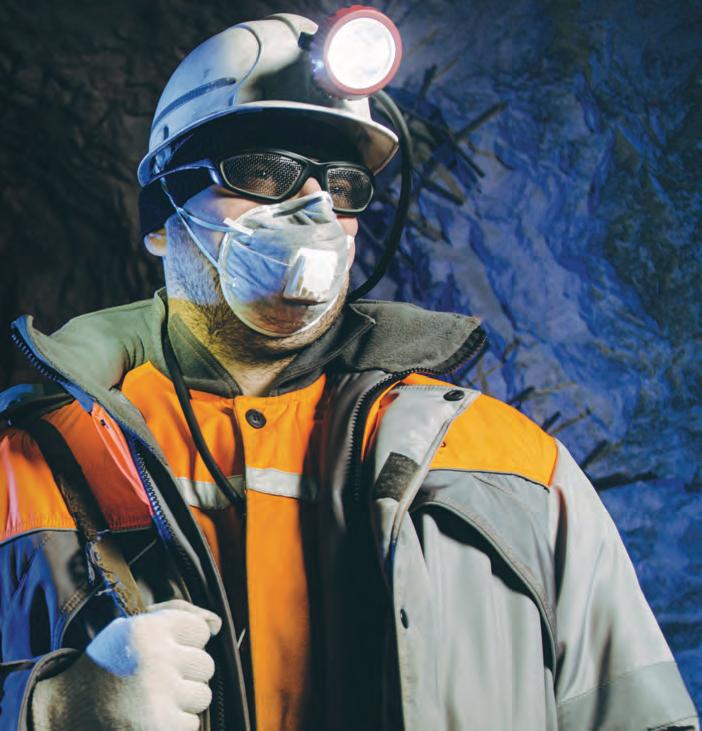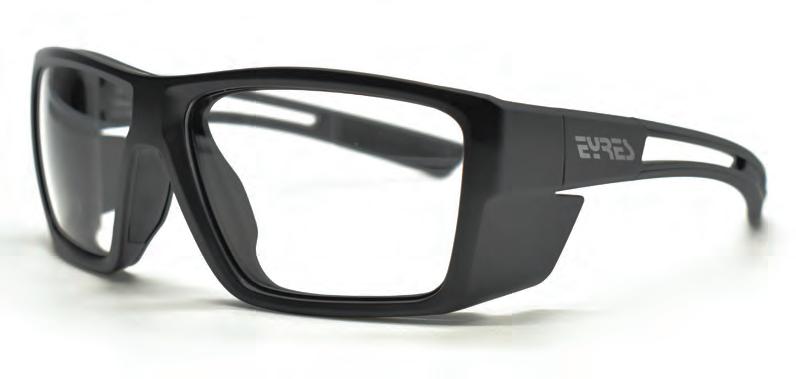
4 minute read
Keeping a keen eye on safety
KEEPING A KEEN
EYE ON SAFETY
SHAMIR AUSTRALIA’S SAFETY LENS RANGE IS HELPING TO PROTECT THE EYES OF THE CONSTRUCTION INDUSTRY, WHILE ALSO PROVIDING EMPLOYMENT FOR LOCAL WORKFORCE. ROADS & INFRASTRUCTURE REPORTS.
Shamir’s safety lenses provide eye protection for different industries.
In just a five-year period between 2010 and 2015, a total of 51,778 Australians were administered to hospital after suffering eye injuries, as reported by the Australian Institute of Health and Welfare.
A report on work-related eye injuries, published by the Australian Safety and Compensation Council in 2008, found that 1049 cases of work-related eye injury resulted in hospitalisation during the twoyear period covered by the study.
With eye injuries still prevalent throughout the construction industry, Shamir Australia is committed to delivering maximum eye protection with its safety eyewear.
The company, which manufactures hundreds of thousands of lenses each year from its Brisbane laboratory, combines its Australian-made specialty prescription lenses with Eyres’ safety frames to create certified eyewear for industrial use.
Shamir Safety Operations Manager Dale Reeves says that Shamir Australia’s manufacturing process is focused on using the best materials and testing each product individually to ensure it can withstand external forces to protect the eyes.
“We start by choosing specific materials which we know will be impact resistant. One such material is TR90, which is a thermal plastic material with great impact resistance values,” Reeves says.
Another highly impact resistant materials is Polycarbonate. Originally developed for aerospace applications, Polycarbonate is a light weight and impact-resistant material, which offers 100 per cent UV protection for users.
Once designed, Shamir’s safety eyewear endures a thorough testing process. This includes the use of a High Velocity Impact Tester, which propels a 6.35-millimetre steel ball up to speeds of 190m/s (684 kilometres per hour) to analyse the safety properties of the product.
“All of our products are medium impact, meaning they can withstand impacts as fast as 45 metres per second, which is the equivalent of 162 kilometres per hour,” Reeves says.
TAILORED DESIGNS Shamir Australia’s range can also satisfy both non-prescription and prescription requirements for customers.
As Reeves explains, the quality of both non-prescription and prescription products is certified through an external auditor, SIA Global.
“All of the frames within our collection satisfy the quality requirements for prescription safety glasses (AS/NZS 1337.6) and for non-prescription safety glasses (AS/NZS 1337.1) and these are verified by SIA Global,” Reeves says. “They have a long list of requirements that we need to meet to achieve certification under the Australian standard.”
All designs are reviewed by SIA Global, through frequent quality checks.
“Part of that certification includes an on-premise audit by SIA Global every year.
The Eyres frame manufacturers in Taiwan also get audited by SIA Global, which gives us assurance that all of our eyewear components are being manufactured the way that we want them to be,” Reeves says.
While Shamir Australia manufactures safety glasses for a wide range of industries, construction and mining are two predominant customers, Reeves says.
“On the non-prescription side, we supply to all of the major PPE stores around Australia. We also have contracts where construction companies, electrical companies, etc. place orders directly with us,” he says.
Individual prescription lenses are manufactured at Shamir’s two storey building in Brisbane, which is home to laboratories with state-of-the-art production and manufacturing equipment.
“On the prescription side of things, we work with a large network of Australian optometrists who check for individual requirements of customers and then we make individual pairs tailored to customers’ eye sights, not dissimilar to purchasing a new set of reading glasses,” he says.
One of the major features, and requirements for quality satisfaction, is the wrapped frames for the wearer. As Reeves says, this feature helps to prevent unlikely eye injuries.
“Lateral eye protection is an important aspect of eye safety, and a part of the certification that products need to satisfy,” he says. “Lateral protection is satisfied in our products through the provision of wrapped lenses, which prevent operators from receiving eye injuries from the side of the head.”

Shamir’s safety lenses can be customised to suit the application at hand.
LENS OPTIONS Shamir Australia’s safety optical lenses can also be customised through a wide range of lens coatings. Each coating serves a unique purpose and suits both indoor and outdoor working conditions.
“For example, an anti-scratch coating protects the glasses if they are dropped onto a hard surface. The anti-reflecting coating enhances the glass wearer’s vision by allowing more light to pass through the lens. An anti-fog lens prevents excess fogging on the lens surface,” Reeves explains.
The choice for the right lens, Reeves says, depends on the conditions the workers will be working in.
“For example, for construction workers who are working outdoors, we recommend polarised lenses or tinted lenses,” he says.
SUPPORTING AUSTRALIAN MANUFACTURING Reeves says Shamir Australia is proud of its Australian-made identity and committed to supporting local employment at its headquarters in Brisbane.
“We just like the idea that we are looking after people in Brisbane, making jobs and keeping jobs here in Australia. So rather than doing what most other lens manufacturers have done, which is taking manufacturing offshore, we are happy to be supporting and training the local workforce,” he says.
While Shamir Australia does have some reliance on international manufacturing for select components, the company still has a long-term vision to maintain its home-grown production base.
“We have facilities all around the world, some of which are even bigger than the one that we have here in Brisbane, but by maintaining local manufacturing, we have built a strong connection with our customer base and that’s something we greatly value,” says Reeves.
For more information, visit: www.shamir.com/au











